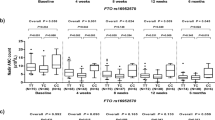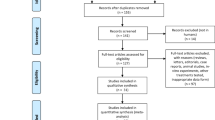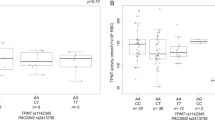Abstract
The conversion of azathioprine (AZA) to mercaptopurine (MP) is mediated by glutathione transferase Mu1 (GSTM1), alpha1 (GSTA1) and alpha2 (GSTA2). We designed a case-control study with data from the TOPIC trial to explore the effects of genetic variation on steady state 6-methylmercaptopurine ribonucleotide (6-MMPR) and 6-thioguanine nucleotide (6-TGN) metabolite levels. We included 199 patients with inflammatory bowel disease (126 on AZA and 73 on MP). GSTM1-null genotype carriers on AZA had two-fold lower 6-MMPR levels than AZA users carrying one or two copies of GSTM1 (2239 (1006–4587) versus 4371 (1897–7369) pmol/8 × 108 RBCs; P<0.01). In patients on MP (control group) 6-MMPR levels were comparable (6195 (1551–10712) versus 6544 (1717–11600) pmol/8 × 108 RBCs; P=0.84). The 6-TGN levels were not affected by the GSTM1 genotype. The presence of genetic variants in GSTA1 and GSTA2 was not related to the 6-MMPR and 6-TGN levels.
This is a preview of subscription content, access via your institution
Access options
Subscribe to this journal
Receive 6 print issues and online access
$259.00 per year
only $43.17 per issue
Buy this article
- Purchase on Springer Link
- Instant access to full article PDF
Prices may be subject to local taxes which are calculated during checkout


Similar content being viewed by others
References
Lamers MM, van Oijen MG, Pronk M, Drenth JP . Treatment options for autoimmune hepatitis: a systematic review of randomized controlled trials. J Hepatol 2010; 53: 191–198.
van Gelder T, van Schaik RH, Hesselink DA . Pharmacogenetics and immunosuppressive drugs in solid organ transplantation. Nat Rev Nephrol 2014; 10: 725–731.
Amin J, Huang B, Yoon J, Shih DQ . Update 2014: advances to optimize 6-mercaptopurine and azathioprine to reduce toxicity and improve efficacy in the management of IBD. Inflam Bowel Dis 2015; 21: 445–452.
Dubinsky MC, Lamothe S, Yang HY, Targan SR, Sinnett D, Theoret Y et al. Pharmacogenomics and metabolite measurement for 6-mercaptopurine therapy in inflammatory bowel disease. Gastroenterology 2000; 118: 705–713.
Eklund BI, Moberg M, Bergquist J, Mannervik B . Divergent activities of human glutathione transferases in the bioactivation of azathioprine. Mol Pharmacol 2006; 70: 747–754.
Moden O, Mannervik B . Glutathione transferases in the bioactivation of azathioprine. Adv Cancer Res 2014; 122: 199–244.
Hayes JD, Strange RC . Glutathione S-transferase polymorphisms and their biological consequences. Pharmacology 2000; 61: 154–166.
Mannervik B, Board PG, Hayes JD, Listowsky I, Pearson WR . Nomenclature for mammalian soluble glutathione transferases. Methods Enzymol 2005; 401: 1–8.
Pelin M, De Iudicibus S, Fusco L, Taboga E, Pellizzari G, Lagatolla C et al. Role of oxidative stress mediated by glutathione-s-transferase in thiopurines' toxic effects. Chem Res Toxicol 2015; 28: 1186–1195.
Hayes JD, Pulford DJ . The glutathione S-transferase supergene family: regulation of GST and the contribution of the isoenzymes to cancer chemoprotection and drug resistance. Crit Rev Biochem Mol Biol 1995; 30: 445–600.
Garte S, Gaspari L, Alexandrie AK, Ambrosone C, Autrup H, Autrup JL et al. Metabolic gene polymorphism frequencies in control populations. Cancer Epidemiol Biomark Prev Publ Am Assoc Cancer Res Am Soc Prev Oncol 2001; 10: 1239–1248.
Broekman MM, Bos C, Te Morsche RH, Hoentjen F, Roelofs HM, Peters WH et al. GST Theta null genotype is associated with an increased risk for ulcerative colitis: a case-control study and meta-analysis of GST Mu and GST Theta polymorphisms in inflammatory bowel disease. J Hum Genet 2014; 59: 575–580.
Stocco G, Martelossi S, Barabino A, Decorti G, Bartoli F, Montico M et al. Glutathione-S-transferase genotypes and the adverse effects of azathioprine in young patients with inflammatory bowel disease. Inflam Bowel Dis 2007; 13: 57–64.
Stocco G, Cuzzoni E, De Iudicibus S, Franca R, Favretto D, Malusa N et al. Deletion of glutathione-s-transferase m1 reduces azathioprine metabolite concentrations in young patients with inflammatory bowel disease. J Clin Gastroenterol 2014; 48: 43–51.
Moon W, Loftus EV Jr. . Review article: recent advances in pharmacogenetics and pharmacokinetics for safe and effective thiopurine therapy in inflammatory bowel disease. Alim Pharmacol Ther 2016 (e-pub ahead of print).
Morel F, Schulz WA, Sies H . Gene structure and regulation of expression of human glutathione S-transferases alpha. Biol Chem Hoppe-Seyler 1994; 375: 641–649.
Coles BF, Morel F, Rauch C, Huber WW, Yang M, Teitel CH et al. Effect of polymorphism in the human glutathione S-transferase A1 promoter on hepatic GSTA1 and GSTA2 expression. Pharmacogenetics 2001; 11: 663–669.
Tetlow N, Board PG . Functional polymorphism of human glutathione transferase A2. Pharmacogenetics 2004; 14: 111–116.
Tetlow N, Liu D, Board P . Polymorphism of human Alpha class glutathione transferases. Pharmacogenetics 2001; 11: 609–617.
Zhang W, Moden O, Mannervik B . Differences among allelic variants of human glutathione transferase A2-2 in the activation of azathioprine. Chemico-Biol Interactions 2010; 186: 110–117.
Ning B, Wang C, Morel F, Nowell S, Ratnasinghe DL, Carter W et al. Human glutathione S-transferase A2 polymorphisms: variant expression, distribution in prostate cancer cases/controls and a novel form. Pharmacogenetics 2004; 14: 35–44.
Coenen MJ, de Jong DJ, van Marrewijk CJ, Derijks LJ, Vermeulen SH, Wong DR et al. Identification of patients with variants in TPMT and dose reduction reduces hematologic events during thiopurine treatment of inflammatory bowel disease. Gastroenterology 2015; 149: 907–917 e907.
Brockmoller J, Kerb R, Drakoulis N, Nitz M, Roots I . Genotype and phenotype of glutathione S-transferase class mu isoenzymes mu and psi in lung cancer patients and controls. Cancer Res 1993; 53: 1004–1011.
Dura P, Salomon J, Te Morsche RH, Roelofs HM, Kristinsson JO, Wobbes T et al. No role for glutathione S-transferase genotypes in Caucasian esophageal squamous cell or adenocarcinoma etiology: an European case-control study. BMC gastroenterology 2013; 13: 97.
Qin ZS, Niu T, Liu JS . Partition-ligation-expectation-maximization algorithm for haplotype inference with single-nucleotide polymorphisms. Am J Hum Genet 2002; 71: 1242–1247.
Lennard L, Singleton HJ . High-performance liquid chromatographic assay of the methyl and nucleotide metabolites of 6-mercaptopurine: quantitation of red blood cell 6-thioguanine nucleotide, 6-thioinosinic acid and 6-methylmercaptopurine metabolites in a single sample. J Chromatogr 1992; 583: 83–90.
Derijks LJ, Gilissen LP, Engels LG, Bos LP, Bus PJ, Lohman JJ et al. Pharmacokinetics of 6-mercaptopurine in patients with inflammatory bowel disease: implications for therapy. Therapeutic drug Monit 2004; 26: 311–318.
Wong DR, Coenen MJ, Vermeulen SH, Derijks LJ, van Marrewijk CJ, Klungel OH et al. Early assessment of thiopurine metabolites identifies patients at risk of thiopurine-induced leukopenia in inflammatory bowel disease. J Crohn's Colitis 2016 (e-pub ahead of print).
Nguyen TV, Vu DH, Nguyen TM, Lachaux A, Boulieu R . Relationship between azathioprine dosage and thiopurine metabolites in pediatric IBD patients: identification of covariables using multilevel analysis. Ther Drug Monit 2013; 35: 251–257.
Lee MN, Kang B, Choi SY, Kim MJ, Woo SY, Kim JW et al. Relationship between azathioprine dosage, 6-thioguanine nucleotide levels, and therapeutic response in pediatric patients with IBD treated with azathioprine. Inflam Bowel Dis 2015; 21: 1054–1062.
Liu H, Ding L, Zhang F, Zhang Y, Gao X, Hu P et al. The impact of glutathione S-transferase genotype and phenotype on the adverse drug reactions to azathioprine in patients with inflammatory bowel diseases. J Pharmacol Sci 2015; 129: 95–100.
Gilissen LP, Wong DR, Engels LG, Bierau J, Bakker JA, Paulussen AD et al. Therapeutic drug monitoring of thiopurine metabolites in adult thiopurine tolerant IBD patients on maintenance therapy. J Crohn's Colitis 2012; 6: 698–707.
Stocco G, Pelin M, Franca R, De Iudicibus S, Cuzzoni E, Favretto D et al. Pharmacogenetics of azathioprine in inflammatory bowel disease: a role for glutathione-S-transferase? World J Gastroenterol 2014; 20: 3534–3541.
Weber G . Biochemical strategy of cancer cells and the design of chemotherapy: G. H. A. Clowes Memorial Lecture. Cancer Res 1983; 43: 3466–3492.
Elion GB . The purine path to chemotherapy. Science 1989; 244: 41–47.
Derijks LJ, Wong DR . Pharmacogenetics of thiopurines in inflammatory bowel disease. Curr Pharm Des 2010; 16: 145–154.
Goldberg R, Moore G, Cunningham G, Schulberg J, Marsh P, Brown S et al. Thiopurine metabolite testing in inflammatory bowel disease. J Gastroenterol Hepatol 2016; 31: 553–560.
Weinshilboum RM, Sladek SL . Mercaptopurine pharmacogenetics: monogenic inheritance of erythrocyte thiopurine methyltransferase activity. Am J Hum Genet 1980; 32: 651–662.
Coskun M, Steenholdt C, de Boer NK, Nielsen OH . Pharmacology and optimization of thiopurines and methotrexate in inflammatory bowel disease. Clin Pharmacokinet 2016; 55: 257–274.
Zur RM, Roy LM, Ito S, Beyene J, Carew C, Ungar WJ . Thiopurine S-methyltransferase testing for averting drug toxicity: a meta-analysis of diagnostic test accuracy. Pharmacogenom J 2016; 16: 305–311.
Acknowledgements
We are deeply indebted to the participants of the TOPIC trial. We thank Rene H.M. te Morsche, J. Salomon and Wilbert H.M. Peters from the Department of Gastroenterology, Radboud University Medical Center, Nijmegen, The Netherlands, for the measurement of TPMT activity, assistance with PCRs and interpretation of data. Furthermore, we thank Mariëlle Maas, Miet Fiddelaers, Milevis Reitsma, Leonie Peters and Jean Cilissen from the Department of Clinical Pharmacy and Toxicology, Zuyderland Medical Center, Sittard-Geleen, The Netherlands for technical assistance with metabolite measurements and Debbie Heinen, Marjolein M.J. van Donkelaar, Freshteh Golestani, Marlies E. de Vos, J.G. Angelien M. Heister, Doménique M.W. Nijsten, Mascha M.V.A.P. Schijvenaars, and Martine E.C. Cranen from the Department of Human Genetics, Radboud University Medical Center, Nijmegen, The Netherlands for their support in data-management. We thank Dr Sita H. Vermeulen, Department of Health Evidence, Radboud University Medical Center, Nijmegen, The Netherlands, and Prof. Dr Barbara Franke, Department of Human Genetics, Donders Institute for Brain, Cognition and Behaviour, Radboud University Medical Center, Nijmegen, The Netherlands, for their contribution to the design of the TOPIC trial. At last, we thank Prof. Dr Joost P.H. Drenth from the Department of Gastroenterology, Radboud University Medical Center, Nijmegen, The Netherlands, for intellectual contributions to the content of the manuscript.
AAM Masclee8, M Pierik8, W Mares8, W Hameeteman8, PJ Wahab9, H Seinen9, MCM Rijk10, IM Harkema10, M de Bièvre11, L Oostenbrug11, CM Bakker11, M Aquarius11, C van Deursen11, AB van Nunen11, JG Goedhard11, M Hamacher11, IAM Gisbertz12, BJ Brenninkmeijer12, ACITL Tan13, MN Aparicio-Pagés13, EM Witteman13, SAC van Tuyl14, R Breumelhof14, A Stronkhorst15, LPL Gilissen15, EJ Schoon15, JWM Tjhie-Wensing16, A Temmerman16, JJ Nicolaï17, JD van Bergeijk18, DJ Bac18, BJM Witteman18, N Mahmmod18, JJ Uil18, H Akol18, RJTh Ouwendijk19, IP van Munster20, M Pennings20, AMP De Schryver20, ThJM van Ditzhuijsen20, RCH Scheffer20, TEH Römkens20, DL Schipper20, PJ Bus21, JWA Straathof22, ML Verhulst22, PJ Boekema22, JTh Kamphuis22, HJ van Wijk22, JMJL Salemans22, JR Vermeijden23, SDJ van der Werf24, RJ Verburg24, P Spoelstra25, JML de Vree25, K van der Linde25, HJA Jebbink25, M. Jansen25, H. Holwerda25, N van Bentem26, JJ Kolkman26, MGVM Russel26, GH van Olffen26, MJ Kerbert-Dreteler26, M Bargeman26, JM Götz26, R Schröder26, JM Jansen27, LP Bos28, LGJB Engels28, MJL Romberg-Camps28, ETP Keulen28, AAJ van Esch29, JPH Drenth29, MCA van Kouwen29, GJA Wanten29, TJ Bisseling29, TEH Römkens29, MWJ van Vugt29, PC van de Meeberg30, SJ van den Hazel30, WNHM Stuifbergen31, MJAL Grubben31, U de Wit31, GAH Dodemont31, RF Eichhorn31, JMH van den Brande32, AHJ Naber32, EJ van Soest32, PJ Kingma32, NC Talstra33, KF Bruin33, FHJ Wolfhagen33, DW Hommes34, PPJ van der Veek34, JCA Hardwick34, RJ Stuyt34, HH Fidder34, B Oldenburg35, TG Tan36
8Department of Gastroenterology, Academisch Ziekenhuis Maastricht, Maastricht, The Netherlands, 9Department of Gastroenterology, Rijnstate Ziekenhuis Arnhem, Arnhem, The Netherlands, 10Department of Gastroenterology, Amphia Ziekenhuis, Breda, The Netherlands, 11Department of Gastroenterology, Atrium Medisch Centrum, Heerlen, The Netherlands, 12Department of Gastroenterology, Bernhoven Hospital, Oss, The Netherlands, 13Department of Gastroenterology, Canisius Wilhelmina Ziekenhuis, Nijmegen, The Netherlands, 14Department of Gastroenterology, Diakonessenhuis, Utrecht, The Netherlands, 15Department of Gastroenterology, Catharina Ziekenhuis, Eindhoven, The Netherlands, 16Department of Gastroenterology, Elkerliek Ziekenhuis, Helmond, The Netherlands, 17HagaZiekenhuis, ‘s-Gravenhage, The Netherlands, 18Department of Gastroenterology, Gelderse Vallei Hospital, Ede, The Netherlands, 19Department of Gastroenterology, Ikazia Hospital, Rotterdam, The Netherlands, 20Department of Gastroenterology, Jeroen Bosch Hospital, ‘s-Hertogenbosch, The Netherlands, 21Department of Gastroenterology, Laurentius Hospital, Roermond, The Netherlands, 22Department of Gastroenterology, Máxima Medisch Centrum, Eindhoven-Veldhoven, The Netherlands, 23Department of Gastroenterology, Meander MC, Amersfoort, The Netherlands, 24Department of Gastroenterology, MC Haaglanden, Den Haag, The Netherlands, 25Department of Gastroenterology, Medisch Centrum Leeuwarden, Leeuwarden, The Netherlands, 26Department of Gastroenterology, Medisch Spectrum Twente, Enschede, The Netherlands, 27Department of Gastroenterology, Onze Lieve Vrouwe Gasthuis, Amsterdam, The Netherlands, 28Department of Gastroenterology, Orbis Medisch Centrum, Sittard-Geleen, The Netherlands, 29Department of Gastroenterology, Radboud university medical center, Nijmegen, The Netherlands, 30Department of Gastroenterology, Slingeland Hospital, Doetinchem, The Netherlands, 31Department of Gastroenterology, St Elisabeth Ziekenhuis, Tilburg, The Netherlands, 32Department of Gastroenterology, Tergooiziekenhuizen, Blaricum-Hilversum, The Netherlands, 33Department of Gastroenterology, TweeSteden Ziekenhuis, Tilburg, The Netherlands, 34Department of Gastroenterology, University Medical Centre Leiden, Leiden, The Netherlands, 35Department of Gastroenterology, University Medical Centre Utrecht, Utrecht, The Netherlands, 36Department of Gastroenterology, Ziekenhuisgroep Twente, Hengelo, The Netherlands.
Author contributions
Study design: MB, GW, DW, MC, DJ. Performed experiments: MB, HR. Metabolite measurements: DW, PH. Data collection: MB, CM, MC, DW. Data analysis: MB, HR, MC. Writing of the manuscript: MB, DW, GW, DJ, MC. Interpretation of data and critical revision of the manuscript for important intellectual content: HG, AV, HS, LD, OK, HR. Study supervision: DJ, MC.
Author information
Authors and Affiliations
Consortia
Corresponding author
Ethics declarations
Competing interests
The authors declare no conflict of interest.
Additional information
Supplementary Information accompanies the paper on the The Pharmacogenomics Journal website
Supplementary information
PowerPoint slides
Rights and permissions
About this article
Cite this article
Broekman, M., Wong, D., Wanten, G. et al. The glutathione transferase Mu null genotype leads to lower 6-MMPR levels in patients treated with azathioprine but not with mercaptopurine. Pharmacogenomics J 18, 160–166 (2018). https://doi.org/10.1038/tpj.2016.87
Received:
Revised:
Accepted:
Published:
Issue Date:
DOI: https://doi.org/10.1038/tpj.2016.87



